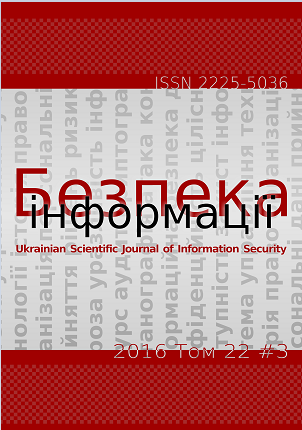Adaptive approaches to cybersecurity of distributed and hierarchical management systems
DOI:
https://doi.org/10.18372/2225-5036.22.11101Keywords:
cybersecurity, information security, threats to society of high technology, information impact matrix values, world view picturesAbstract
The problem of cybersecurity in terms of destructive information impact is one of the acute problems in modern societies and the future of high technology. Management systems, as well as information technologies have become highly complex and intensely automated. In the field of public administration and management information critical production level is reinforced by the increased amount of information to be processed, distributed communications intensive, hierarchical systems and the emergence of new vulnerabilities and potential threats. Existing scientific and practical work does not fully take into account the current requirements of regulatory guidance documents on security of distributed and hierarchical control systems make it impossible to take into account the analysis and evaluation of safety management behavior of choice and security needs of society generated new material technology in a society of high technology. On this basis, on the base of historical analysis of transformation of the basic going near a privy, which is used managements, the adaptive going is offered near a construction hierarchical four levels of the system of cybersecurity: from providing of cybersecurity of informative packages and information to providing of safety of matrices of values and pictures of vision of the world. Futures papers will relate to methods of realization of approaches development for providing formed in this paper.
References
Агеев А.И. Вектор перемен / А.И. Агеев, С.В. Авдеев, Рыжов В.Н. и др. // Экономические стратегии. – № 4, 2016. – С. 84-106.
Путин использует бойню в Украине, что-бы репетировать войну с Западом / The Times, 10 августа 2016. [Электронный ресурс] – Режим досту-па: http://glavnoe.ua/news/n279723.
Стратегія кібербезпеки України / Указ Президента України від 15 березня 2016 р., №96/2016. – 11 с.
Харченко В.П. Базова модель формування вимог до забезпечення кібербезпеки цивільної авіа-ції / В.П. Харченко, О.Г. Корченко, С.О.Гнатюк // Ukrainian Scientificjournal of Information Security, 2016, Vol. 22, Issue 2, p. 150-155.
Денисов А.А. Нетократия и рефлексия: За-секречивание в постиндустриальном обществе / А.А Денисов // Рефлексивные процессы и управ-ление. – Том 7, № 1, 2007. – С. 33 -50.
Луцкий Г.М. Адаптивный подход к обеспечению безопасности распределенных компьютерных систем / Г.М. Луцкий, В.Е. Мухин // Вісник КДПУ імені Михайла Остроградського. Випуск 5/2007 (46). Частина 1. С. 30-34.
Ализар А. Концепция адаптивной архи-тектуры безопасности от аналитика Garrtner / А. Ализар. 2014. [Электронный ресурс] – Режим доступа: https://xakep.ru/2014/07/09/adaptive-security-architecture.
Корченко О.Г. Оцінювання шкоди націо-нальній безпеці України у разі витоку державної таємниці : Монографія / О.Г. Корченко, О.С. Архи-пов, Ю.О. Дрейс. – К.: наук.-вид. центр НА СБ Укра-їни, 2014. – 332 с.
Тарасюк М.В. Защита трафика инфоком-муникационных сетей и средств компʼютерной разведки / М.В. Тарасюк // Защита информации. Инсайд. 2015, № 6. – С. 62-68.
Лефевр В. Алгебра совести / В. Лефевр // Пер. с англ. – М.: «Когнито центр». 2003. – 55 с.
Никитенко Е.Г. Облик перспективной информационно-управляющей системы обеспече-ния национальной безопасности России / Е.Г. Никитенко, Н.А. Сергеев // Оборонно-промышленный комплекс России. Т. 8. 2012. – С. 491-506. – Режим доступа: http://federalbook.ru/files/OPK/Soderjanie
/OPK-8/V/Nikitienko.pdf.

